 August 2019 in “Journal of Medical Histology”
August 2019 in “Journal of Medical Histology” EMT helps heal tissues but can cause scarring and other issues if prolonged.
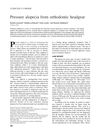 16 citations,
September 2008 in “American Journal of Orthodontics and Dentofacial Orthopedics”
16 citations,
September 2008 in “American Journal of Orthodontics and Dentofacial Orthopedics” Wearing orthodontic headgear can cause reversible hair loss if detected early.
 January 2023 in “Voennaâ medicina”
January 2023 in “Voennaâ medicina” Hair loss in women can improve with iron and vitamin supplements if caused by iron deficiency.
 December 2020 in “Journal of Drugs in Dermatology”
December 2020 in “Journal of Drugs in Dermatology” The document concludes that more research is needed to confirm if blood tests for things like iron and vitamin D are helpful for hair loss from Telogen effluvium.
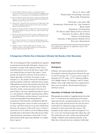 February 2015 in “Dermatologic Surgery”
February 2015 in “Dermatologic Surgery” Smaller reticle sizes are as accurate as the standard size for measuring hair density in hair restoration.
1 citations,
September 2015 in “Hair transplant forum international” 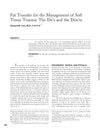 8 citations,
November 2010 in “Facial Plastic Surgery”
8 citations,
November 2010 in “Facial Plastic Surgery” Fat transfer can be effective for soft tissue trauma if the patient is chosen carefully and the procedure is done correctly.
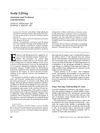 5 citations,
September 1994 in “The Journal of Dermatologic Surgery and Oncology”
5 citations,
September 1994 in “The Journal of Dermatologic Surgery and Oncology” Scalp lifting surgery can safely and effectively reduce baldness if done with careful planning and proper technique.
 September 2023 in “Frontiers in bioengineering and biotechnology”
September 2023 in “Frontiers in bioengineering and biotechnology” JAGGED1 could help regenerate tissues for bone loss and heart damage if delivered correctly.
 6 citations,
December 2011 in “Drug Research”
6 citations,
December 2011 in “Drug Research” Finasteride's two formulations absorb similarly, showing bioequivalence.
 41 citations,
December 2008 in “Current Opinion in Ophthalmology”
41 citations,
December 2008 in “Current Opinion in Ophthalmology” Certain eye surgery complications can be managed effectively, especially in patients who have used specific prostate medications.
 28 citations,
March 2010 in “Histochemistry and Cell Biology”
28 citations,
March 2010 in “Histochemistry and Cell Biology” Different markers are found in stem cells of the scalp's hair follicle bulge and the surrounding skin.
 April 2019 in “Abstracts”
April 2019 in “Abstracts” Adding colchicine stopped the girl's recurring heart issues caused by lupus.
 April 2024 in “Expert opinion on investigational drugs”
April 2024 in “Expert opinion on investigational drugs” JAK inhibitors are safe and effective for treating moderate-to-severe alopecia areata.

People with early onset hair loss (Androgenetic Alopecia) in Ile-Ife, Nigeria, have significantly lower iron levels compared to those with adult-onset hair loss.
36 citations,
January 2000 in “British journal of dermatology/British journal of dermatology, Supplement” A mother and daughter had severe skin, hair, and eye issues linked to IFAP.
Effective treatments and proper care can manage hair disorders.
22 citations,
July 2006 in “Annals of The Royal College of Surgeons of England” Hair or fiber wrapped tightly around a toe can lead to serious injury if not treated quickly.
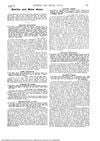 May 1948 in “Journal of the American Medical Association”
May 1948 in “Journal of the American Medical Association” The reply suggests checking for false positive or asymptomatic syphilis and using penicillin for treatment if necessary.
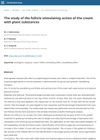 September 2017 in “Klìnìčna farmacìâ”
September 2017 in “Klìnìčna farmacìâ” The cream with plant substances can stimulate hair follicles.
1 citations,
February 2021 in “Benha Journal of Applied Sciences” Higher IMA levels in male AGA patients, especially if obese, may link AGA to metabolic and heart issues.
 November 2009 in “Hair transplant forum international”
November 2009 in “Hair transplant forum international” Doctors should collaborate with the patient's primary care physician to decide if it's safe to stop taking Plavix before hair restoration surgery, considering the risk and benefit.
 138 citations,
November 2015 in “Journal of Pharmacology and Experimental Therapeutics”
138 citations,
November 2015 in “Journal of Pharmacology and Experimental Therapeutics” Protoporphyrin IX is useful in cancer treatment but can cause health problems if not properly regulated.
October 2018 in “Hair Disorders” January 2014 in “Astrocyte” Some drugs may cause hair loss in women.
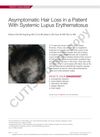
Fungal infections can cause hair loss in lupus patients and should be considered even if rare.
Betamethasone is more effective long-term for alopecia areata than hydroxychloroquine.

I'm sorry, but I cannot process the document as it is not in English. If you provide an English summary or conclusion, I can help summarize that for you.
 65 citations,
June 2020 in “Stem Cell Research & Therapy”
65 citations,
June 2020 in “Stem Cell Research & Therapy” Certain immune system proteins are important for skin healing but can cause problems if there are too many of them.
6 citations,
January 2004 in “Acta dermato-venereologica”





















